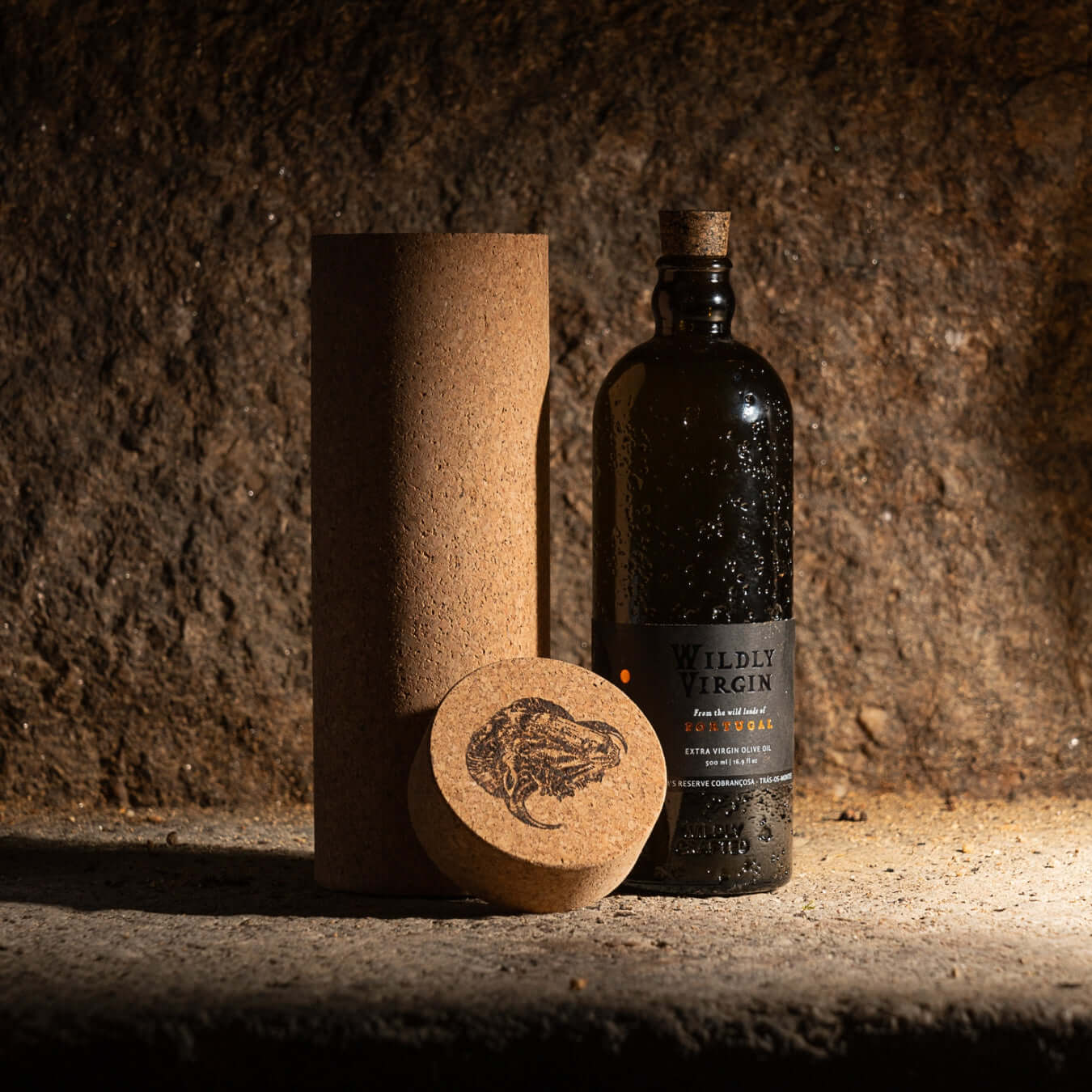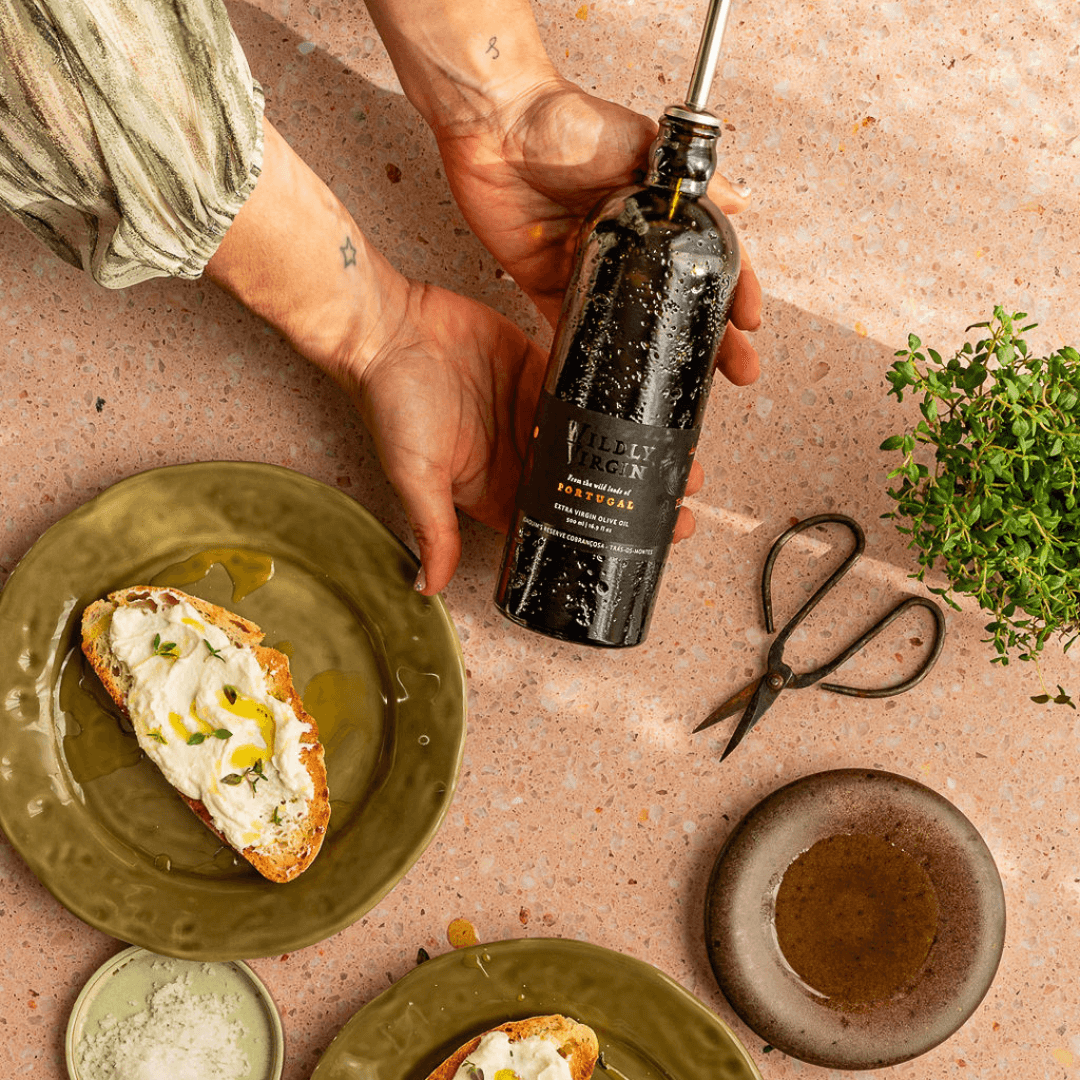At Wildly Virgin, we're passionate about bringing you the purest expression of Portuguese olive groves, and we believe everyone deserves to experience the difference quality makes.
But with aisles overflowing with bottles, how do you navigate the world of olive oil and choose the best? It's not as simple as grabbing the prettiest label. Just like wine, coffee, or chocolate, the quality of olive oil is determined by a multitude of factors, from the olive itself to the journey it takes from tree to bottle.
Fear not, fellow food adventurers! We're here to equip you with the knowledge to become a discerning olive oil connoisseur. Let's dive into the key attributes that separate exceptional olive oil from the ordinary.
1. Freshness is King: Seek the Harvest Date
Imagine reaching for a vibrant, freshly picked fruit versus one that's been sitting on the shelf for months. The same principle applies to olive oil! (Olive oil is just olive juice.) Freshness is paramount for flavor, aroma, and even nutritional benefits.
The problem with "Bottled On" dates: Many bottles only display a "bottled on" date. This is misleading because olive oil can be stored for a significant period before bottling. You could be buying oil that's already a year old, even if it was just bottled last month!
The Gold Standard: Harvest Date. Truly transparent producers will proudly display the harvest date. This tells you exactly when the olives were picked and pressed. Aim for the most recent harvest date you can find. Think of it like checking the "best before" date on other fresh produce – the closer to the harvest, the better.
Wildly Virgin Tip: We believe in transparency. You'll always find the harvest date clearly indicated on our Wildly Virgin bottles, so you know you're getting the freshest taste of Portugal.
2. Olive Variety: Unlocking the Flavor Map
Just like wine grapes, different olive varieties (cultivars) create a stunning spectrum of flavors. Portugal, with its diverse microclimates and ancient olive groves, is a treasure trove of unique olive oil profiles.
Some olive varietals like Galega or Arbequina are mild, buttery and fruity. These are versatile oils perfect for everyday cooking. Others like Cobrançosa are intense and robust. These have aromas of green herbs, a pleasing bitterness and a peppery finish.
Learn more by exloring our Guide to Portugal's Native Olive Varieties
Wildly Virgin Tip: Explore our single-varietal olive oils to discover the unique personality of each Portuguese olive. Experiment and find your favorites for different culinary applications!
3. Acidity: The Unsung Hero of Olive Oil Quality (and Why We Tell You Ours)
You might see "acidity" mentioned on some olive oil labels, usually as a percentage. But frankly, most olive oil producers don't talk about acidity much. It's a bit of an industry secret, or at least, an understated quality indicator. At Wildly Virgin, we believe in full transparency, which is why we proudly display the acidity level for every single bottle on our website. Why? Because for those who truly want to understand olive oil quality, acidity is incredibly important.
Acidity in olive oil is NOT about taste (it won't taste acidic like lemon juice!). Instead, it's a measure of free fatty acids and a crucial indicator of the quality of the olives and, critically, the production and milling process. Think of it like this: acidity is a report card on how well the olive oil was made, from grove to bottle.
Why Lower Acidity Signals Superior Quality:
- Healthy, Pristine Olives: Lower acidity begins with harvesting perfectly healthy, undamaged olives at their optimal ripeness. Bruised, damaged, or overripe olives immediately start to break down, leading to higher acidity.
- Gentle & Swift Handling: From the moment of harvest, careful handling is key. Minimizing bruising during picking and transport, and ensuring olives are milled as quickly as possible, helps preserve their quality and keep acidity low.
- Masterful Milling: The milling process itself is critical. Rapid processing in a meticulously clean and modern mill, kept at cool temperatures, is essential to prevent oxidation and degradation. Higher acidity can often point to delays in milling, or less-than-ideal milling practices.
The Gold Standard: Low Acidity in EVOO. Extra Virgin Olive Oil (EVOO), the highest grade, by definition must have an acidity level of 0.8% or less. However, within EVOO, lower is significantly better. A truly exceptional EVOO will often have acidity levels far below 0.8%. (All of Wildly Virgin's olive oils have a maximum acidity of 0.2%)
Wildly Virgin Transparency: We believe in empowering you with information. That's why you can find the acidity levels for all of our olive oils on their webpages. We are committed to meticulous harvesting and milling, so our Wildly Virgin oils consistently achieve exceptionally low acidity levels – a guarantee of superior quality and flavor that we are proud to share. For the most discerning olive oil lovers, acidity is a key metric, and we invite you to explore the levels of ours.
4. Containers Matter: Ditch the Plastic, Embrace the Dark
Think about protecting your precious olive oil from its enemies: light, oxygen, and now, also microplastics.
Plastic is a Problem on Multiple Fronts: Plastic bottles, especially clear ones, are problematic for several reasons:
- Oxygen Permeability: They are permeable to oxygen, which degrades olive oil over time, leading to rancidity and loss of flavor.
- Light Permeability: Clear plastic offers little protection from harmful light, especially UV light, further accelerating oxidation and quality decline.
- Microplastic Contamination: Crucially, plastic bottles themselves degrade and leach microplastics into your olive oil. Over time, especially with temperature fluctuations and light exposure, the plastic breaks down, releasing microscopic plastic particles into the oil you're consuming. This is not only a quality concern but also a growing potential health concern.
- Environmental Unfriendliness: Beyond the oil itself, plastic is simply not a sustainable packaging choice, contributing to plastic waste and pollution.
Dark Glass is the Superior Choice: Dark glass bottles (amber or dark green) are the gold standard for olive oil packaging. They provide a superior barrier against:
- Light: Effectively blocking harmful light and preventing oxidation.
- Oxygen: Glass is impermeable to oxygen, maintaining freshness and preventing rancidity.
- Microplastics: Glass is inert and does not degrade or leach microplastics into the oil.
- Sustainability: Glass is recyclable and more environmentally friendly than plastic in the long run.
Other Good Options (Less Ideal than Dark Glass but better than Plastic): Stainless steel containers and tin-lined cans are also acceptable alternatives, as they are opaque and prevent light exposure.
Wildly Virgin Tip: You'll find Wildly Virgin olive oil exclusively in dark glass bottles. We are committed to protecting the integrity of our oil from degradation, oxidation, and microplastic contamination. We believe in delivering the purest, highest quality olive oil to your kitchen, and that starts with choosing the right container.
5. Traceability & Single Origin: Know Where Your Oil Comes From
In today's globalized food system, it's easy for olive oil to become a blend of olives from multiple farms, regions, or even countries. While blended oils can be perfectly acceptable, single-origin olive oil offers a higher level of transparency and often, enhanced quality control.
The Power of Single Origin:
- Full Traceability: Single-origin means you can trace your oil back to a specific farm, grove, or region. You know exactly where your olives were grown and who produced the oil.
- Consistent Quality & Flavor: Producers focused on single-origin oils often have tighter control over every stage of production, leading to more consistent quality and a more distinct flavour profile reflective of their specific terroir.
- Supporting Sustainable Practices: Choosing single-origin often supports smaller producers who are committed to sustainable farming and preserving traditional methods.
Beyond "Product of X": Many bottles state "Product of [Country]". This can be misleading, as olives could be sourced from various farms across that country, or even imported from other nations and simply bottled in that location. A lot of that "Italian Extra Virgin Olive Oil" comes from olives imported from other countries!
Ask the Questions: Look for brands that are transparent about their sourcing. Websites and labels should ideally specify the farm or region of origin.
Wildly Virgin Tip: At Wildly Virgin, we are proud to be a single-origin brand. We will always tell you who the producer is, what region their farm is in, and what variety they used, ensuring complete traceability.
Bonus Factor: Exploring Polyphenols
Beyond acidity, you might also hear about polyphenols in olive oil. These are naturally occurring antioxidants that contribute to the health benefits and some flavor nuances (like a peppery kick or slight bitterness) found in high-quality EVOO. Polyphenol levels are influenced by factors like olive variety and harvest timing – oils made from olives harvested slightly earlier in the season, and certain varietals, tend to be richer in polyphenols.
While not as widely discussed as acidity when assessing basic quality, polyphenols are certainly a valued component, especially for those seeking the maximum potential health benefits from their olive oil.
Some brands promote ultra-high polyphenol levels by picking olives too early, thus sacrificing flavor. So this is something to look at, but don't purchase solely by this criteria.
Wildly Virgin reports polyphenol levels for all or our products on their respective web page.
Learn more at our Complete Guide to Polyphenols.
Become a Savvy Olive Oil Shopper!
Choosing the best olive oil might seem daunting at first, but armed with this knowledge, you're well on your way to becoming a savvy shopper. Remember to prioritize:
- Freshness (Harvest Date)
- Understanding Varieties & Regions
- Acidity as a Key Quality Indicator
- Protective Containers (Dark Glass)
- Traceability & Single Origin (when possible)
By considering these factors, you'll not only elevate your culinary creations but also support producers who are dedicated to quality, sustainability, and bringing you the true essence of the olive.
Ready to experience the Wildly Virgin difference? Explore our range of Portuguese single-origin olive oils and taste the passion in every drop!












